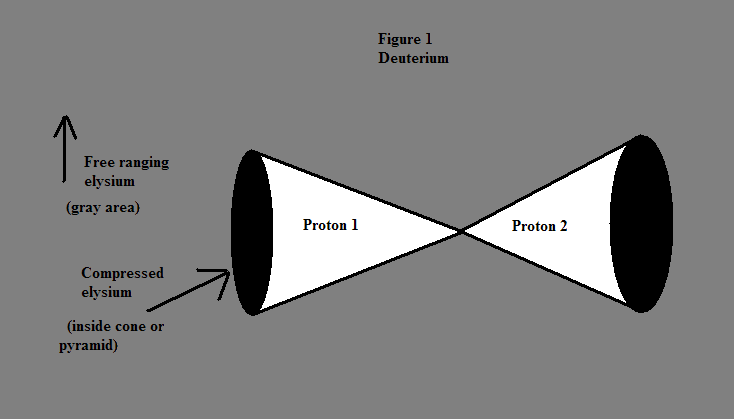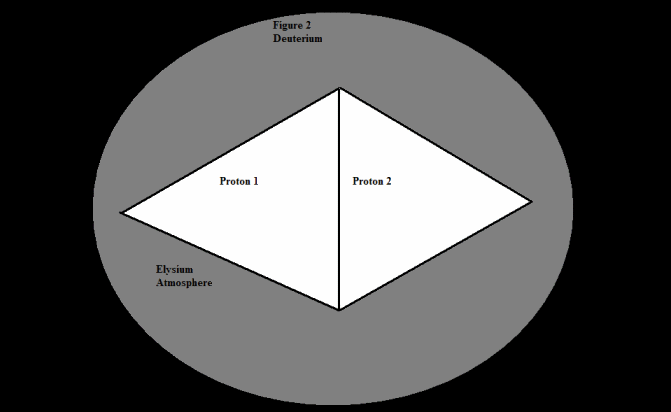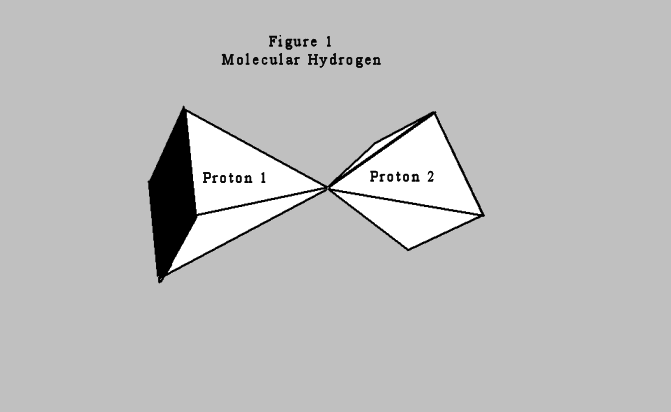- Thank you received: 0
Deep-Gas, Deep Hot Biosphere Theory
17 years 5 months ago #18180
by Gregg
Replied by Gregg on topic Reply from Gregg Wilson
<blockquote id="quote"><font size="2" face="Verdana, Arial, Helvetica" id="quote">quote:<hr height="1" noshade id="quote"><i>Originally posted by neilderosa</i>
Gregg, Do either of these two illustrations have any resemblance to what you are describing?
<hr height="1" noshade id="quote"></blockquote id="quote"></font id="quote">
Hi Neal
Yes, there is a resemblence. However, I would describe the first picture as molecular hydrogen and the second picture as deuterium. It looks like they are hollow cones. My only difference would be to give them four sides in order to account for the two isomers of Helium-3.
If someone else came up with this algorithm then that is very good news. (In that I will not be alone at Happy Acres.)
Gregg Wilson
Gregg, Do either of these two illustrations have any resemblance to what you are describing?
<hr height="1" noshade id="quote"></blockquote id="quote"></font id="quote">
Hi Neal
Yes, there is a resemblence. However, I would describe the first picture as molecular hydrogen and the second picture as deuterium. It looks like they are hollow cones. My only difference would be to give them four sides in order to account for the two isomers of Helium-3.
If someone else came up with this algorithm then that is very good news. (In that I will not be alone at Happy Acres.)
Gregg Wilson
Please Log in or Create an account to join the conversation.
- neilderosa
-
- Offline
- Platinum Member
-

Less
More
- Thank you received: 0
17 years 5 months ago #19799
by neilderosa
Replied by neilderosa on topic Reply from Neil DeRosa
<blockquote id="quote"><font size="2" face="Verdana, Arial, Helvetica" id="quote">quote:<hr height="1" noshade id="quote">Yes, there is a resemblence. However, I would describe the first picture as molecular hydrogen and the second picture as deuterium. It looks like they are hollow cones. My only difference would be to give them four sides in order to account for the two isomers of Helium-3.
<hr height="1" noshade id="quote"></blockquote id="quote"></font id="quote">
<hr height="1" noshade id="quote"></blockquote id="quote"></font id="quote">
Please Log in or Create an account to join the conversation.
- Larry Burford
-
- Offline
- Platinum Member
-

Less
More
- Thank you received: 0
17 years 5 months ago #19728
by Larry Burford
Replied by Larry Burford on topic Reply from Larry Burford
Neil,
Thanks for the drawings. Pictures are worth a lot more than a thousand words.
I'm still not having much luck visualizing the naked particles. Would you be willing to take a stab at drawing them, based on Gregg's earlier response to my request for their description?
Just take your best shot. It is almost guaranteed that changes will need to be made once we all have the same picture to look at.
LB
Thanks for the drawings. Pictures are worth a lot more than a thousand words.
I'm still not having much luck visualizing the naked particles. Would you be willing to take a stab at drawing them, based on Gregg's earlier response to my request for their description?
Just take your best shot. It is almost guaranteed that changes will need to be made once we all have the same picture to look at.
LB
Please Log in or Create an account to join the conversation.
- Larry Burford
-
- Offline
- Platinum Member
-

Less
More
- Thank you received: 0
17 years 5 months ago #18185
by Larry Burford
Replied by Larry Burford on topic Reply from Larry Burford
Neil,
Gregg has never mentioned a shape for his "drop of elysium" model of the electron. Since it is referred to as liquid, a sphere seems appropriate. Unless it comes in contact with something else. Then that other thing would influence the shape of the electron.
===
Relative size of proton and electron? No idea. Gregg - any guidance?
Mainstream models are all over the place. Some call electrons "point particles". Literally zero volume. Other models have them as big or bigger than atoms (this might be more representative of Gregg's model). And there are some in-between guesses.
Gregg has never mentioned a shape for his "drop of elysium" model of the electron. Since it is referred to as liquid, a sphere seems appropriate. Unless it comes in contact with something else. Then that other thing would influence the shape of the electron.
===
Relative size of proton and electron? No idea. Gregg - any guidance?
Mainstream models are all over the place. Some call electrons "point particles". Literally zero volume. Other models have them as big or bigger than atoms (this might be more representative of Gregg's model). And there are some in-between guesses.
Please Log in or Create an account to join the conversation.
- Larry Burford
-
- Offline
- Platinum Member
-

Less
More
- Thank you received: 0
17 years 5 months ago #18281
by Larry Burford
Replied by Larry Burford on topic Reply from Larry Burford
One more thing - the pyramids you have drawn have five sides.
Please Log in or Create an account to join the conversation.
17 years 5 months ago #18186
by Gregg
Replied by Gregg on topic Reply from Gregg Wilson
<blockquote id="quote"><font size="2" face="Verdana, Arial, Helvetica" id="quote">quote:<hr height="1" noshade id="quote"><i>Originally posted by Larry Burford</i>
<br />One more thing - the pyramids you have drawn have five sides.
<hr height="1" noshade id="quote"></blockquote id="quote"></font id="quote">
When I say a four sided pyramid, I am not counting the base - especially if it isn't there! The geometric proton could be a hollow hemisphere, a rotated half elipse, a hollow cone, a three sided pyramid, a four sided pyramid, etc. I have simply picked one of them. If this goes no further than suggesting that the geometry could influence the behavior of the particle - then we get away from implicitly demanding that each particle has to be a little Einstein with his Junior Woodchuck Manual and a navigator named Bucky.
Larry, I have not looked at elysons other than to presume that Elysium can be either liquid or vapor - and is compressible. But be worried: I will predictably start with trying out geometric shapes for elysons.
Yes, an electron released from a nucleus would probably be liquid and would probably be a sphere. But I haven't put any thought into it.
Gregg Wilson
<br />One more thing - the pyramids you have drawn have five sides.
<hr height="1" noshade id="quote"></blockquote id="quote"></font id="quote">
When I say a four sided pyramid, I am not counting the base - especially if it isn't there! The geometric proton could be a hollow hemisphere, a rotated half elipse, a hollow cone, a three sided pyramid, a four sided pyramid, etc. I have simply picked one of them. If this goes no further than suggesting that the geometry could influence the behavior of the particle - then we get away from implicitly demanding that each particle has to be a little Einstein with his Junior Woodchuck Manual and a navigator named Bucky.
Larry, I have not looked at elysons other than to presume that Elysium can be either liquid or vapor - and is compressible. But be worried: I will predictably start with trying out geometric shapes for elysons.
Yes, an electron released from a nucleus would probably be liquid and would probably be a sphere. But I haven't put any thought into it.
Gregg Wilson
Please Log in or Create an account to join the conversation.
Time to create page: 0.290 seconds



